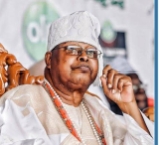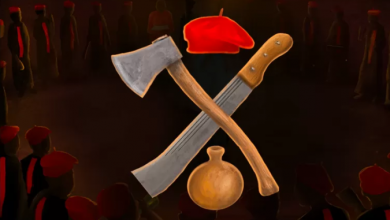
AWUJALE: Nigerians react to Islamic burial
CITIZENS COMPASS—That some traditionalists were denied access to perform traditional rites on the body of the late Oba Sikiru Adetona, the Awujale of Ijebuland in Ogun State is nolonger news, what is news is the controversies surrounding it and the perceived aftermath of such action.
Ijebuland being one of the cultural towns in Nigeria is adjudged by many as the home of tradition with the recent burial of the Awujale generating mixed reactions across religious settings.
On Monday, videos circulating on social media revealed that traditionalists attempting to pay their last respects to the late Awujale were driven away from the venue of the Islamic funeral rites at Ogbagba Court, Igbeba residence, in Ijebu-Ode.
The incident occurred while Imams were preparing for the Islamic prayers where the late Awujale was interred contrary to traditional belief.
Citizens Compass reported that the monarch joined his ancestors on Sunday at the age of 91 years.
He reigned for 65 years.
According to an eyewitness, Adedire Adetona, the king’s first son, had instructed that traditionalists would not be allowed to attend the funeral, prompting soldiers to chase them away.
The recent Islamic burial of the late Oba Sikiru Kayode Adetona, the revered Awujale of Ijebuland, has ignited a nationwide debate over tradition, identity, and the evolving nature of Yoruba kingship.
The monarch, who ruled for 65 years, was buried in accordance with Islamic rites on July 14, 2025, just a day after his passing. His burial, however, has drawn sharp criticism from traditionalists and cultural purists who view the act as a betrayal of ancestral customs.
In a widely circulated segment aired on VOP TV and shared on X (formerly Twitter) by user @ILE_AJISEFA, a guest analyst articulated what has become a resounding critique:
“You allowed the traditionalists to keep you in a secluded place for three months, performing rites every day. You sat on the throne for 65 years, and suddenly you now changed the game, saying you are now a born-again Muslim.”
The analyst continued by comparing the situation to how other civilizations uphold cultural rites:
“As sophisticated as Britain is, look at the rites they performed when the Queen died. A particular stone was brought out, even a goat led the military parade. If they, at that level, uphold their culture, why should we walk away from ours? If you know you are not ready for these things, stay away from traditional roles. It is not by force to be a king.”
This commentary struck a nerve online, prompting a wave of emotional responses. While a few users defended the late monarch’s right to religious freedom, the majority were emphatic in their disapproval.
Reactions:
@RareTega echoed the sentiment, writing, “I agree with the speaker.”
@Olly_bantin lamented, “The King is Dead, and Our Traditions Were Buried With Him.”
@MrOdunfa was more direct: “He betrayed his ancestors. His children will pay for it.”
Some commenters went as far as calling for systemic change: “A king without tradition is a useless king,” wrote @adetilola_a. “They should ban his lineage from the throne.”
@zimakoalice drew comparisons with other civilizations: “The Chinese, Koreans, Indians still keep their traditions despite modernization. We were told ours is evil and we accepted it.”
Others questioned the role of the kingmakers and traditional councils who allowed the burial to proceed in contradiction to what many consider the rightful ancestral rites. “If the Ogboni and Afobaje truly have power, they should have acted that day,” wrote @oyeledum.
Yet, not all reactions were damning. A few users, like @bayusforrealman, defended the Awujale: “Alhamdulillah, your curse has nothing to do with Awujale. It is due to your ignorance that you believe he is not ending well. May Allah grant you insight.”
Still, the overarching narrative remains one of tension. Awujale had, during his lifetime, sponsored the Ogun State Chiefs Law of 2021, which explicitly allowed monarchs to choose religious rites over traditional ones for burial. His decision to be buried according to Islamic rites was not a surprise to insiders, but the public display of its enforcement — including military intervention to block traditionalist groups from the burial site — has left deep divisions.
For many Yoruba cultural custodians, the debate is no longer just about the late Awujale, but about the soul of Yoruba tradition and the compatibility of monarchy with Abrahamic religions. “If you can’t keep tradition, refuse the crown,” @originality2024 insisted.
This moment has become a defining cultural flashpoint, signaling a deepening rift between modernity and heritage, faith and custom. Whether this leads to reforms in the kingship selection process, or a tightening of traditional expectations for future rulers, remains to be seen. But one thing is certain: in death, the Awujale has sparked a conversation Yoruba land can no longer avoid.
A social media user, Ojeniyi Ayoade, wrote, “Awujale Sikiru Kayode Adetona Ogbagba ll told lies against the traditional stool in order to destroy it. He was just about 26 when he was installed as Awujale. He had nothing. He knew nothing about why they came to capture him in Deloitte London. Ogbeni Oja Odutola made him. He later fought the same man. He married 2 sisters of the same mother and father ( he wrote this in his book) which is against the Yoruba tradition. He enjoyed life to the fullest on the traditional stool. It is not a Muslim stool. As he was about to go he decided to destroy the stool because Oku ko mehin ‼️
“IFA Oracle chose Sikiru’s father but Ogbeni Oja Odutola didn’t want to install an illiterate and he asked if his son was educated. He said that his son was reading Accountancy in London, the next day Odutola went to London to bring home Prince Sikiru Kayode Adetona. The rest is history.
High Ogboni Chief Priest, Barrister Dr Oladoyin Odebowale wrote: “He was an arrogant, conceited hypocrite. He created the fallacy that the Ijebu people migrated from Waddai in Sudan to rival the Ooni as the Spiritual Head of the Yoruba race. He impregnated two blood sisters and used his Islamic religion to justify it. He enjoyed immense benefits from his position yet he did all unimaginable things to destroy the tradition of his people. He used his influence to mobilise other impressionable simpletons called Oba to change the tradition of the Yoruba people to suit the Arab culture. All the lies told about Osugbo beating dead bodies or dismembering the corpse of an Oba are a figment of his corrupt imagination. Awujale Gbelegbuwa died in 1959. He was a student on scholarship when it happened. Could the Osugbo and the Ogbeni Oja have preserved the heart of the late king for him to eat? Was he around when the late Awujale died to witness the dismembering of the body? He used traditional authority to curry favours from the governments and wealthy sons and daughters of Ijebuland. He downgraded the Agemo festival and replaced it with the Islamic Durbar known as Ojude Oba. While he was fighting for supremacy with the Ooni Sijuwade, he was taking instructions from the Sultan of Sokoto. He joined Zik, Akintola and Ahmadu Bello to send Awolowo to jail. He was disrespectful to the Government of Ogun State, hence his deposition by the late Bisi Onabanjo. He travelled without permission. It was the military coup which brought Diya that saved him. He was indicted by Justice Sogbetun Panel for insubordination, recklessness bordering on partisanship. He supported the defunct NPN, openly, against the ruling party, UPN. He was such an arrogant element who forgot how he was chosen. His father was not a man of means. The fact that he was studying abroad on scholarship made him the most qualified candidate from the Anikilaya Ruling House. The AG Government wanted an educated Oba after Awujale Gbelegbuwa. Sikiru Adetona negated all the positive values for which the Yoruba people are reputed. His fabled principled fight for June 12 was because of the late MKO Abiola, who was with him in NCNC, NNDP and NPN. He fought against Subomi Balogun, the founder of the FCMB, when he suspected that his growing influence might dim his own waning authority among the Ijebu. He accused him of nursing the ambition to succeed him. How could that have been his business? He promoted the Imams over traditional worshippers. He said Ifa was nothing. He was a Muslim from Sudan. Sikiru Adetona ku ni, ko wo Aja.
Ojeniyi Ayoade
Another social media post was titled, “Defiant, even in death,
from the mouth of Awujale himself, I share here again my post of 17th March, 2017.
Demystifying the myths in Yorubaland.
It reads: AWUJALE: The Autobiography of Oba Sikiru Adetona, Ogbaba II, makes for an interesting read. According to Awujale, who as a young man studying accountancy in the UK, was brought home to assume the throne of his forefathers, “there’s nothing to these rituals of coronation………. All the secrecy which they maintain about these rituals are nothing but a ploy to extort money. They deliberately make them look mysterious.” “Indeed, the Odis (who carried out the rituals during my coronation) were themselves novices who were merely engaged in experiments and guesswork”.
Kabiyesi writes …..”at the Owa Stream, the Elese of Ilese carried me on his back across the stream as, according to tradition, my feet must not touch the water. After this, the Elese must never come to Ijebu-Ode again to visit me for the rest of his life. Also at Odo Esa, I passed an Iroko tree which, by tradition, I must never see again. Indeed, I was forbidden to ever pass that road again or, according to tradition, I would die. I did not believe any of this and have since travelled that road and passed the Iroko tree several times.”
…………….”Also at Ijebu-Imusin, there was again another tree at Oja Imusin which I passed and was never to set eyes on again. Yet, I have since seen the tree on many occasions.”
Kabiyesi, who revealed these ‘secrets’ during his 80th birthday, documenting them for posterity, lived on to be 91 years’ old – rubbing final salt into the injury of his adversaries by getting buried in line with the Islamic tradition.
It is a fair argument on the part of those who believe that a man who was installed by tradition and benefited from it, should not turn his back on the same system. I concur. But let them also accept that it was an equally fair argument for the Kabiyesi who knew them to be lies to expose them as such.
Nothing has happened. Nothing will happen. What further proof does one need that the entire obligatory rituals are nothing more than what in Yoruba land, we call jeun-jeun. Stomach infrastructure. In the words of Fela Anikulapo Kuti, “shakara oloje”
Apologies to my friends and readers from Ijebu land who remain incurable adherents of these mythical beliefs. Kabiyesi said they’re all lies. However, if you do have any reservations about this, please direct them to the palace. I have only done copy & paste from Kabiyesi’s book.
On my part, I praise the late Royal Highness for this boldness and expo. And I hope that my friend Ayoade Ojeniyi – the biggest advocate of Isese that I know – is reading this. Awujale said everything is jẹun-jẹun. *Copied from Sheikh Nojeem Jimoh
—With additional information from GWG







